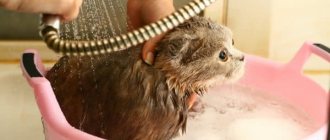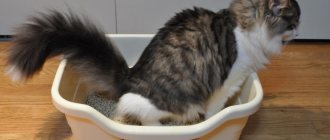According to veterinarians, chicken and quail eggs are beneficial for cats if consumed in moderation and heat-treated. Cat owners need to take into account that some pets may have an allergic reaction to the protein component of the product. If the animal's diet is rich in minerals, then before including eggs that contain high doses of Ca, you need to check the optimal amount with your doctor.
Diet
A cat's diet should mostly consist of animal proteins .
For them, eggs are an additional source of protein, which is on par with meat and fish. Methionine, lysine, tryptophan are amino acids that are part of protein and are of great benefit to pets. Shiny coat, prolongation of the active period of life, good immunity, good mood, prevention of heart disease - this is all the merit of eggs. Any food must include a whole egg. In addition to proteins, they contain a large amount of vitamins and minerals, which ensure normal functioning of the entire body. Eggs are rich in phosphorus, calcium, iron and magnesium. Thanks to them, cats’ blood vessels and joints will be healthy, bones will be strong, and hormones will remain in balance.
Harm and benefit
A chicken egg contains protein, potassium, magnesium, vitamin D, phosphorus, sodium, iron and other useful microelements that promote healthy growth and proper development of the pet.
Benefits of eggs in a kitten's diet:
- an easily digestible product ensures a good mood and healthy sleep;
- strengthens the immune system, skeletal system and muscles;
- ensures normal functioning of the whole body;
- improves metabolic processes;
- restores nerve cells;
- normalizes brain activity;
- helps cleanse blood vessels;
- improves acid-base and hormonal balance;
- improves the condition of teeth and gums;
- increases the activity of kittens;
- has a beneficial effect on the condition of the coat, which acquires shine and silkiness.
Considering the list of beneficial properties, the question - can cats have boiled eggs becomes irrelevant, because the answer to it is quite obvious!
However, there are some disadvantages of this product. For example, egg white can cause allergic reactions in a pet, which is manifested by severe itching of the skin, upset stool and vomiting.
If such symptoms are detected, exclude protein from the cat’s diet! You can only leave the yolk on the menu, which is quite healthy and completely safe for animals prone to allergic reactions.
Is it healthy to give to a cat?
To enrich your pet’s diet with minerals, veterinarians recommend scalding the shells, crushing them into dust and adding them to food.
The nutritious product is easily absorbed by the cat’s body and replenishes the need for vitamins and minerals. Eggs contain Ca, Mg, K, Na and Fe, which have a beneficial effect on the central nervous system of a pet, improve the condition of joints and the cardiovascular system. The products also contain ergocalciferol, which strengthens tooth enamel, and cobalamin, which improves brain function. Biotin has a beneficial effect on the condition of the cat's fur, and amino acids, which the animal's body cannot independently synthesize, improve visual abilities. Research by veterinarians has revealed the following positive changes in the bodies of cats that have had boiled eggs added to their menu:
By consuming such a product, the animal puts its rest and wakefulness regime in order.
- strengthening natural immune defenses;
- stabilization of hormonal levels;
- maintaining the balance of alkalis and acids in the body;
- preventing bleeding from the gums;
- replenishment of energy reserves;
- normalization of metabolic processes;
- acceleration of muscle growth;
- regeneration of nervous tissue;
- normalization of sleep and wakefulness;
- destruction of fat accumulations on the inner walls of blood vessels;
- improved mood.
How often?
Although a food product is very healthy, this does not mean that it should be given to the animal often; variety is very important in nutrition. It is enough to give your cat eggs 2-3 times a week , but not whole eggs, but in fractions. That is, one egg should be divided into three meals. An adult cat can be offered one egg per week, but small kittens should not be given it until they get used to cottage cheese and meat, that is, it is necessary to try it for the first time when the animals are 3 months old. You can also offer quail eggs to animals; they contain less cholesterol and are therefore considered more healthy.
If in doubt
So should you feed your cat eggs? When in doubt, it is best to consult a veterinarian. The doctor will clarify the diagnosis, conduct a consultation, and give nutritional recommendations.
Many animals themselves refuse treats. This happens in case of allergies.
Chicken or quail
Quail eggs are better than chicken eggs only in that they are digested better and faster and contain a little more nutrients . A quail egg will bring much less benefit to a cat than a domestic chicken egg. Chicken and quail eggs can equally contain bacteria that lead to salmonellosis.
They can also cause allergic reactions and intolerance. Quail eggs can be fed to pregnant cats. If she is reluctant to eat them, then you should mix them into her main food. Cats that are preparing to become mothers need vitamins more than others, so you can feed them quail eggs two to three times a week.
Contraindications for use
Veterinarians prohibit giving eggs if there is an individual intolerance to the product, pathologies of the excretory system, as well as stones in the gall bladder. Liver diseases are not a categorical contraindication, but before changing your diet you should consult your doctor. During the period of gestation, the product should also be discarded, because it can harm the babies. If a cat loves eggs, but after eating it shows signs of an allergic reaction, veterinarians recommend eliminating the protein and trying to reintroduce the dish. Another way is to switch to quail eggs, which are allowed even to babies under 3 months old. and pregnant cats.
Do you need to cook?
A good option is to offer your pet boiled eggs . They can be mixed with meat or cottage cheese if he refuses the product in its “pure” form. It is not recommended to give fried eggs in oil to cats. The best option would be to pamper your cat with a steamed omelette without adding salt. To make it fluffy and tasty, add warmed milk while whipping.
Under no circumstances should cats be offered raw eggs! They may contain E. coli, which will lead to inflammation of the pancreas. In their raw form, they are very poorly digestible. Crude protein can remove a number of vitamins from the body, and leads to their deficiency, even if the cat’s nutrition is complete. Raw yolk is considered healthy, but only from homemade and fresh eggs.
Important! Quails should also not be offered raw to cats, because there may be bacteria on the shell and inside that can lead to very dangerous diseases.
Boiled eggs are no less dangerous for animals than raw eggs. They need to be cooked for at least four minutes, because the causative agents of salmonellosis die only at high temperatures. In this case, you can be sure that your pet will eat a safe product that will not cause any harm.
Can it be harmful to the pet?
Heat-treated eggs are healthy, but some pets may experience an allergic reaction. The most common negative symptoms include diarrhea, gagging, skin rashes and scabies. However, only the protein causes such a reaction; the yolk can be given even to pets prone to allergies. Felinologists also note that if a cat is intolerant to a certain product, it begins to actively lick its paws. If a cat's diet contains a lot of vitamins and minerals, then introducing eggs will lead to an excess of them.
In what form can you give eggs to a kitten?
You can give kittens both chicken and quail eggs. The latter are considered more useful because they contain less cholesterol, are more nutritious and are easier to digest by the body. Pregnant and lactating females should be given any eggs with caution, as they can negatively affect the offspring.
To avoid harm to the kittens, giving raw eggs is strictly prohibited! The raw product may contain salmonella. Kittens aged 1-2 months are especially susceptible to salmonellosis. This dangerous intestinal infection can be fatal.
© shutterstock
Raw egg whites contain advidin, a substance that is dangerous for cats and leads to a lack of biotin. A deficiency of this vitamin manifests itself in kittens in the form of skin lesions, exhaustion, nausea, and hypertension.
Raw quail eggs should also not be given to pets, as they may contain pathogens of dangerous diseases, to which young individuals are especially susceptible. You should not offer your kitten fried eggs; a large amount of fat will lead to digestive problems.
To be sure that the product will not harm the baby, it needs to be boiled for about 5 minutes. The quantity should also be limited - 1/4 of a chicken yolk or 1 whole quail, no more than 1-2 times a week.
Composition and benefits of eggs
The main place in the diet of pets is given to animal proteins. Therefore, the basis of a cat’s diet is meat, and eggs serve as an additional source of protein, which is easily digestible. Eggs are considered the only natural product that has a balanced combination of nutrients, amino acids, trace elements and vitamins.
Proteins are necessary for the normal development of the body: cats obtain vital amino acids from them; in addition, protein is required to strengthen the immune system and is a source of energy: it can be “deposited” in the body in the form of fat.
Protein requirements vary throughout a cat's life, depending on age and health. Average protein and fat requirements for cats:
- during the period of growth and development: proteins – 30%, fats – 20%;
- adult animals: proteins – 25-30%, fats – 15-20%.
Important!
Pregnant and lactating cats, as well as sick and weakened animals, require additional proteins, and for pets with kidney pathologies, on the contrary, their consumption should be reduced.
Eggs contain amino acids necessary for the body of pets. For normal life and activity, each cat needs 22 different amino acids, and only 12 of them can be synthesized in its body, the rest must be supplied there ready-made. Vital amino acids include taurine, lysine, methionine, tryptophan and others.
Egg dishes
Pets enjoy eating steamed omelettes. You need to add a little milk to the egg. Spices are not added to the dish. Fat is also contraindicated.
Boiled eggs are healthy, nutritious, and desirable on a cat’s menu. They can be served along with porridges and vegetable purees. But you should avoid fried eggs. They do not benefit the animal's body.
For whom eggs are contraindicated?
Some cats have an individual intolerance to egg whites, and eggs cause allergic reactions in them. Allergy symptoms include itching, swelling, and rashes can be observed around the ears and face. Possible vomiting and intestinal upset. In these cases, chicken eggs should not be given to the cat. Quails are also allergic, so the ban applies to them as well.
Raw eggs (especially white eggs) should not be fed to pregnant or lactating cats; eggs should be added to the diet of animals suffering from liver and kidney pathologies, chronic heart and vascular diseases with extreme caution. If possible, it is better to exclude them from the diet.
Important!
The yolks of chicken and quail eggs are strictly prohibited for animals with urolithiasis.
You need to be careful when giving industrially produced eggs to cats - at some poultry farms, chickens may be given antibiotics to protect them from infectious diseases. With eggs, antibacterial additives can enter the animal’s body, where they can reduce the functions of the immune system and cause improper functioning of internal organs.
Important!
It is recommended to consult a veterinarian before formulating a diet. Before adding eggs to your pet’s food, it is advisable to get tested for the content of vitamins in its body.
Shell
You can add a pinch in ground form.
But if the cat suffers from urolithiasis, then the shells should not be consumed. Also, it is better for miniature breeds to avoid this product altogether.
Photo of feeding cats eggs
Felix food for cats: reviews, composition overview, use in the diet, price and food combinations (125 photos)What to feed a sterilized cat: video tips on how to properly, what and when to feed a cat after sterilization (125 photos + video)
Wellness for cats - choice of food, analysis of composition, reviews and overview of the most popular types (100 photos)
Read here Can a cat have raw meat - what kind of meat can be given to cats, tips and recommendations for choosing a portion (80 photos)
Help the site, share with friends 
2
How to teach your pet to eat eggs
Sometimes the cat starts to eat and eats the product itself. But some animals turn their faces away. The product is odorless, so it is better to gently poke the purr with your nose. Then he understands that he needs to eat it, and starts eating.
If a cat constantly rejects eggs, then you should not force him. This product just doesn’t suit him for some reason.
Salmonella
The first signs of the disease will be vomiting and diarrhea. You need to call a veterinarian immediately. To avoid such situations, raw eggs are rarely given to cats, but it is better to boil them.
When boiling, the egg itself should be kept in boiling water for at least 4 minutes, then it will definitely undergo good heat treatment.
"Acana" and "Origen" - high protein food?
Acana ready-made cat diets contain 37% protein (41% dry matter basis). In Orijen this figure is even higher - 40-44% taking into account moisture (44-49% in terms of dry matter). Of course, compared to other foods, our food looks high-protein and is often positioned as such in retail outlets. However, delving into the question, it is easy to see that this amount of protein is quite adequate for cats.
It is known that our domestic animals are obligate (that is, strict) predators. In nature, their main food is birds, rodents, lizards and other small animals. If you take the same mouse and dry it to 10% moisture (the average dry food), it will contain about 50% pure protein.
Which cats need a high protein diet?
It is necessary for all healthy domestic cats, regardless of gender, age and hormonal status. But it is especially important to get an adequate amount of protein for animals:
- during pregnancy and lactation;
- in the first year of life and in old age;
- with increased physical activity;
- with a tendency to be overweight.
In addition, it is worth considering that two foods with the same amount of protein may not be of equal quality. Therefore, you need to compare ready-made diets comprehensively, and not according to one indicator, and first of all, carefully read the composition.
High-quality sources of protein for cats include grass-fed meat, pork, poultry, eggs, fish and other clearly labeled valuable animal products. It is important that the manufacturer clearly states in the composition what type of animal the raw materials were obtained from and in what state the ingredient was added to the feed, for example, raw lamb, fresh salmon, dehydrated chicken liver. You should not assume that meat flour can serve as a complete substitute for meat. It is often produced from the cheapest and least valuable parts of carcasses, and even if there is a lot of protein in such food, this does not mean that it will be effectively absorbed.
Also, food with a high level of protein from plant materials (for example, with a large volume of grains, and especially various plant protein isolates, such as corn gluten) is not credible - this is unsuitable food for cats, which is not only poorly absorbed in their gastrointestinal tract, but also in basically inferior in amino acid content.











